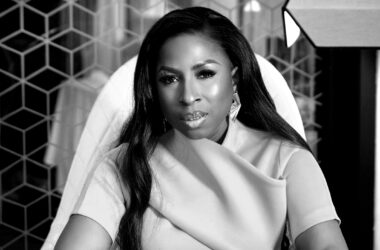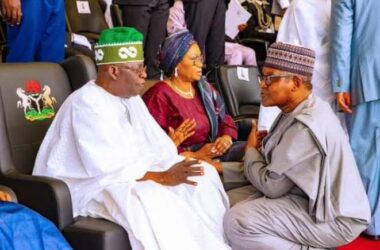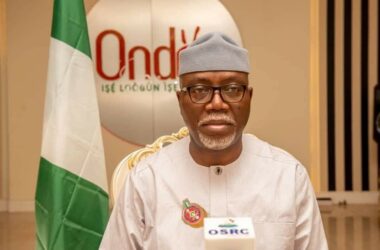When the news broke that Joe Biden had picked a woman to be his running mate as he attempts to replace Donald Trump as President of the United States of America via the ballot in that country’s upcoming presidential election, many Nigerians who had never heard of Kamala Harris were curious about her identity. How is she both African American and Asian-American at the same time? Oh, she is a Senator too? Yes, she is all of that but the fact that she is the third female vice presidential running mate on a major party ticket in a democracy that we all try to emulate should prompt us to look within and ask some pertinent questions.
When will a woman ever be elected as a State Governor in Nigeria? When will a woman ever become President of Nigeria?
Indeed there is a widely held view in Nigeria that a woman cannot be trusted with the role of Commander-in-Chief of our Armed Forces. There are long-standing sociocultural precepts that disfavour a woman from being President of Nigeria and despite the occasional token nod to women’s empowerment; those precepts constitute formidable barriers to seeing a woman emerge as President in Nigeria. In all of Nigeria’s diverse ethnic nationalities, you may not find one in which a woman is permitted to be king or the eminent regal personality! Even at local government level, not one woman currently holds the position of local government chairman! Nigeria has never had a female Vice President. There is an unwritten, strongly enforced and widely believed “code” which holds that a woman’s foremost ambition should be to be a successful homemaker, taking care of the home front while the men exercise the sovereign or executive leadership powers in and behalf of their community.
As at 2012, a report by the U.K’s Department For International Development (DFID), Nigeria ranked 118th on the global gender inequality index. In a thread that is common to almost every ethnic group in Nigeria, most women who actively participate in politics are viewed as irresponsible, labeled with suspicions of promiscuity and being of easy virtue and unable or unwilling to keep their home. Most critical political meetings seem to take place at night and at hours when most women ought to be home taking care of their families. As a result of this, most women are unwilling to upset the sociocultural equilibrium and would rather participate in the political process as voters, than as candidates to be voted for. The high financial costs of vying for elective offices is also a hindrance for many women and even if somehow a woman is able to find sponsors for her campaign, the generality of the public would view her candidacy as unviable or as one in which if she were to be elected, she would be merely a puppet in the hands of those who sponsored her campaign.
As we consider the place of women rising in Nigerian politics, Sarah Jibril is one brave woman we must not forget. As far back as 1992, she threw her hat in the ring and contested to be the flag bearer of the Social Democratic Party in that year’s presidential election. She was unsuccessful but tried again in 1998 under the People’s Democratic Party (PDP) only to encounter the same outcome. Undeterred, she moved to the Progressive Action Congress and secured the party’s flag in the 2003 presidential election, becoming the first ever woman to contest in a Nigerian presidential election. At the polls, she managed to score 157, 560 but it was only 0.40 of all votes cast. Where were the millions of Nigerian women who made up more than 50% of registered voters? How come they did not rally around one of their own and vote massively for her? Some said the party platform was largely unknown and that people in Nigeria tend to vote based on the name of the political party. Trudging on, in 2011 Sarah Jibril went back to the PDP and vied for the Party’s presidential ticket. What happened at the PDP’s presidential primary was sad indeed. Of all the votes cast that night including the ones by several women present, she only got one meaning most likely that the only vote she got was the one she cast for herself! Nigerian women certainly did not do themselves a favour that day. Yes, Dr. Goodluck Jonathan appointed her as Special Adviser on Ethics and Values when he won the 2011 presidential election but it appears the blow she was dealt on her fourth attempt at becoming President has put an end to her laudable aspirations.
Interestingly, not one woman in Nigerian history has become as State Governor from “open play” or directly from a general election. There has only been one female Governor but that clearly happened as a stroke of fate. Dame Virginia Etiaba was serving as Deputy Governor in Anambra State with Peter Obi at the helm. Due to a power tussle and gang up against him by certain unscrupulous elements in Anambra State, he was impeached and his deputy was favoured by time and chance to become Governor, even if only for a few months. Her tenure lasted from November 2006 to February 2007 and was plagued behind the scenes by many men whose patriarchal egos were bruised by their mistake in taking out her boss, Peter Obi. Before those hawks could come in for the kill, an Appeal Court ruling reinstated Peter Obi as Governor and thus ended the joys many Nigerian women felt at having one of their own hold such a high office. It appears many of Nigeria’s leading political parties learned from the Anambra situation as virtually none of them have made the “mistake” of letting another woman come so close to power as Deputy Governor. In the rare instances where we do have a female Deputy Governor, like in Rivers State currently, the woman is deliberately relegated to the background as is barely seen, let alone heard.
Yet the trend across Africa is changing and we have seen female Presidents in Africa. From Ellen Johnson Sirleaf in Liberia, to Joyce Banda in Malawi, to Catherine Samba-Panza of the Central African Republic and to Sahle-Work Zewde in Ethiopia, women are being encouraged to as a manner of speaking, aim for the moon instead of merely crying for it. Of all the political parties in Nigeria, the ruling All Progressives Congress (APC) seems to be the one that may be inclined towards empowering women to contest for, and win, notable leadership positions. In 2015 the APC picked Aisha Jummai Al-Hassan, popularly known as Mama Taraba as its candidate in the Taraba State governorship election. In a topsy turvy turn of events, the PDP candidate was initially declared winner but then the State Governorship Election Tribunal declared Mama Taraba the winner on a technicality. The PDP candidate in the election went to the Appeal Court and his appeal was successful. Mama Taraba challenged this at the apex court and the Supreme Court ruled in favour of the PDP’s Darius Ishaku. What would have been a first and fitting victory for Nigerian women in politics was thus aborted.
The APC should give continue to give women the chance to govern states and especially so in its more cosmopolitan states like Lagos. Indeed an ideal candidate for such a position is the distinguished Senator Oluremi Tinubu who has represented the Lagos Central Senatorial Constituency at the National Assembly since 2011. Like Sir Shina Peters sang in his classic “Shinamania” album, we should “Give our women chance to rule”. The emergence of Senator Kamala Harris as potential Vice President of the U.S.A should serve as a wake-up call for women in politics in Nigeria to strive harder to break the glass ceiling that has prevented them thus far from rising to the very top. It’s already happening in the private sector. Why not in the public sector?






